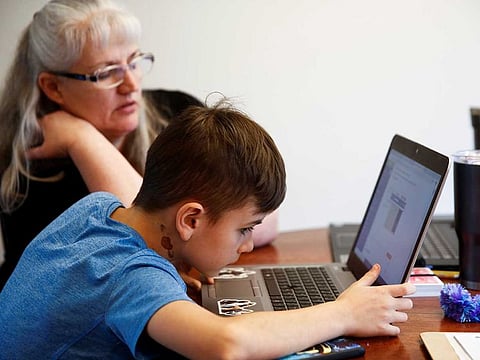Loneliness in the time of the coronavirus
Social distancing and virtual social networking have taken over our lives

A man sits in his living room, with a cheeseburger in hand, watching the latest press conference by some health emergency official. The situation is slightly improving but we are not quite there, says the official.
Outside the man’s home, the streets are deserted, except for the sporadic armed patrols, and the hundreds of dusty cars parked on both sides of the road. One can catch a glimpse of a couple of people hunkering down at a street corner. They have nowhere to go.
Restaurants, cafes and shops are closed. Supermarket shelves are empty. The few customers who dared show up fight for that last bottle of sanitiser or roll of toilet paper.
People are scared to leave their homes. They have been told to stay indoors. They are too afraid to speak to the next-door neighbours. Children are on their phones and PlayStation sets all day.
Up until a few weeks ago, the world was all about social networking in both worlds; real and virtual. Today, it’s all about social distancing.Mohammed Almezel, Editor at Large, Gulf News
Planes are grounded. Airports are shut. Gadgets take over daily life. Goods are delivered by drones. Families and friends interact via video calls. Birthdays and anniversaries are celebrated by exchanging tired music clips and meaningless emojis on WhatsApp.
This is not a scene from a post-apocalyptic movie. This is just a realistic section of life in a major European city in the time of coronavirus.
As Europe becomes the new epicentre of the pandemic, life, as we know it, has halted. Experts expect a rapid rise in the number of infections, and the death toll will naturally increase dramatically.
Governments are understandably taking draconian measures to stop the spread of the disease in the hope that a vaccine could be found soon. World Health Organisation on Friday said a vaccine may not be developed before August. We are looking at four more months of increasingly restrictive measures, including compulsory self-quarantine.
The human cost of the pandemic is absolutely the only cost we should care about. Nevertheless, there are other costs involved, particularly the economic impact of the coronavirus. The global economy is heading towards a deep recession. Markets around the world have lost trillions of dollars. Oil-producing states, in the Arabian Gulf and outside, lost tens of billions of dollars in revenues due to the deteriorating demand because of the declining economic activities and the shrinking economic growth worldwide.
There is another victim in this crisis that stands out although it may not be quantified; the human way of life, our social interaction which has for thousands of years been the core characteristic of societies. Today the rational thing to do, we are told by authorities, is ‘social distancing’. Stay away from other humans as possible. Don’t hug your children. Don’t shake hands of friends. Keep your distance, literally. Or even better, stay home altogether. Work remotely. Study online. Order your food and groceries online.
New social habits
Up until a few weeks ago, the world was all about social networking in both worlds; real and virtual. Today, it’s all about social distancing.
It takes considerable time for societies to develop new ways of life, traditions and cultures. Humans need ample time to learn and apply new social habits. We are social animals.
It took societies more than two decades to learn and master the modern habit of virtual social networking. Communities world apart are now connected through new technology. The world became smaller and smaller with every new invention.
The technology allowed us to know and appreciate other countries. The advances in air travel made it so easy to visit these places. It has become easy and fun to travel to London on the weekend to catch a Liverpool game or just attend a friend’s wedding in Delhi. Large gatherings and mega events like music concerts, horse racing, exhibitions and shopping festivals have become a regular fixture of the modern state.
Bridging the social distance
Now, we have to learn to leave all that behind. We must deconstruct this way of life. We have to learn to live alone. We are not sure for how long. It could be a month; perhaps much longer. Life as we know it is being interrupted. Expert after expert appears on TV and YouTube to offer us tips on how to live in isolation, how to keep yourself busy at home while you wait for the all-clear signal.
As we are being forced to isolate ourselves and our families, it will take time to restore our ability to socialise when the pandemic disappears. For some, it will be challenging to learn to bridge the social distance, to mingle again. Social distancing surely leads to loneliness and unproductive lifestyle. We will have to get up on our feet again and be productive.
I asked a friend the other day what he’d do if the coronavirus continued for a year and he had to stay home all along. He said he’d die from depression. I like to think that he was joking.
Also Read: Is the coronavirus media’s Frankenstein?
Sign up for the Daily Briefing
Get the latest news and updates straight to your inbox



